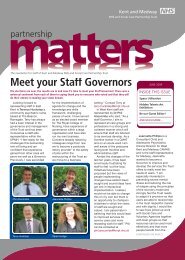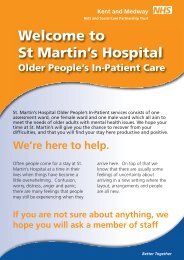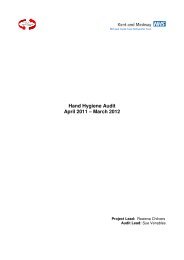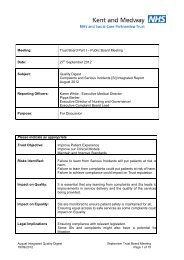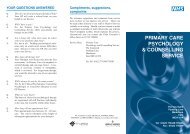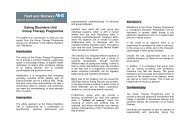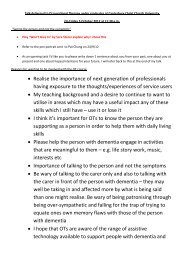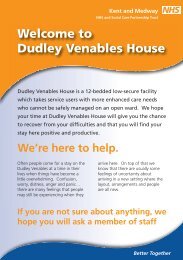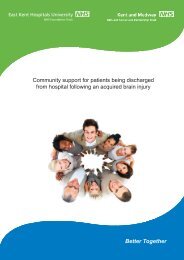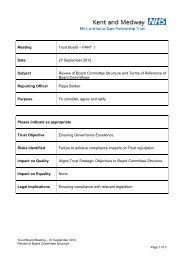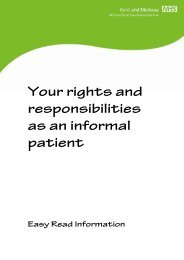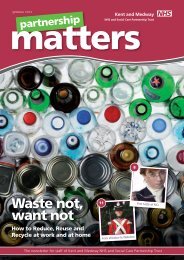Five things you should know about dementia - Alzheimer's Society
Five things you should know about dementia - Alzheimer's Society
Five things you should know about dementia - Alzheimer's Society
Create successful ePaper yourself
Turn your PDF publications into a flip-book with our unique Google optimized e-Paper software.
5<strong>things</strong> <strong>you</strong><br />
<strong>should</strong> <strong>know</strong><br />
<strong>about</strong> <strong>dementia</strong>
1<br />
Dementia is<br />
not a natural<br />
part of ageing
When someone voices fears <strong>about</strong> becoming forgetful or confused, people<br />
often reassure them that this is a normal part of ageing. But are they right?<br />
It is true that <strong>dementia</strong> is more common among over-65s, and some of us<br />
do become more forgetful as we get older, or during times of stress or illness.<br />
But <strong>dementia</strong> is a different sort of forgetfulness. Many of us may momentarily<br />
forget a friend’s name. But if <strong>you</strong> have <strong>dementia</strong>, <strong>you</strong> may forget that <strong>you</strong><br />
have ever met them before. Your memory loss will be more noticeable, and<br />
may be accompanied by mood changes and confusion.<br />
Forgetfulness and confusion are not always signs of <strong>dementia</strong>, but it is very<br />
important to ask the doctor to check them out. Drugs are available that can<br />
help people with certain forms of <strong>dementia</strong>. Other medication can help with<br />
symptoms that often accompany <strong>dementia</strong>, like anxiety or insomnia. So if <strong>you</strong><br />
aren’t diagnosed, <strong>you</strong> could be missing out. And if <strong>you</strong> don’t have <strong>dementia</strong>,<br />
<strong>you</strong>r forgetfulness may indicate another condition – such as depression –<br />
that needs to be treated.<br />
To find out more <strong>about</strong> <strong>dementia</strong>, go to<br />
alzheimers.org.uk
Poopal<br />
After I came to the UK, my brain was not working properly. I used to go walking<br />
and not come back, and when my wife asked me to go shopping, instead of<br />
buying eggs I would buy tea. I was very worried. The doctors examined me<br />
and gave me medicine. Since then it’s been much better. I still forget <strong>things</strong> –<br />
I wouldn’t say I’m 100 per cent – but I’m probably 70 per cent.<br />
I like reading, and we often go for three mile walks in the park. Sometimes<br />
we visit the neighbours or we go to the temple, or shopping with the children.<br />
I used to grow a lot of vegetables in the garden – aubergine, cabbages and<br />
sweet potato – which we cooked in curry with rice.<br />
Our family is very close. We live with our son’s family, and I am never alone –<br />
there are always people around us. They understand that I have memory<br />
problems, but they don’t worry <strong>about</strong> these <strong>things</strong>. Our grandchildren are<br />
wonderful. In the early days, I used to carry them to kindergarten. Now they<br />
are growing up.<br />
I am happy. I have had a really good life. My philosophy is to be happy with<br />
the family – the future is good for us.
I wouldn’t<br />
say I’m<br />
100 per cent,<br />
but I’m<br />
probably<br />
70 per cent.
2<br />
Dementia is<br />
caused by diseases<br />
of the brain
Dementia is the name for a collection of symptoms that include memory<br />
loss, mood changes and problems with communication and reasoning.<br />
These symptoms are brought <strong>about</strong> by a number of diseases that cause<br />
changes in the brain.<br />
The most common of these is Alzheimer’s disease. Alzheimer’s changes the<br />
chemistry and structure of the brain, causing the brain cells to die off. The<br />
first sign is usually short-term memory loss. Other types of <strong>dementia</strong> include<br />
vascular <strong>dementia</strong>, <strong>dementia</strong> with Lewy bodies and Pick’s disease.<br />
Each of these diseases affects the brain in slightly different ways. For example,<br />
Alzheimer’s disease tends to progress gradually at first, while vascular <strong>dementia</strong><br />
tends to progress in a stepped way.<br />
But a person’s experience of <strong>dementia</strong> will depend on other <strong>things</strong> too –<br />
the people around them, their personal circumstances, and the environment<br />
they live in. Dementia progresses in a way that is unique to each individual.<br />
To find out more <strong>about</strong> <strong>dementia</strong>, go to<br />
alzheimers.org.uk
3<br />
It’s not just<br />
<strong>about</strong> losing<br />
<strong>you</strong>r memory
People often think of <strong>dementia</strong> as a form of memory loss. And usually it does<br />
start by affecting people’s short-term memory. But it’s more than that: it can<br />
also affect the way people think, speak and do <strong>things</strong>.<br />
Dementia makes it harder to do <strong>things</strong> because it makes it difficult to plan and<br />
learn new activities, and interferes with structured tasks like writing. Dementia<br />
can also make it harder to communicate. For example, the person might have<br />
trouble remembering the right word or recognising who someone is.<br />
Dementia also affects people’s mood and motivation levels. This may happen<br />
if the disease affects the part of <strong>you</strong>r brain that controls emotions. But even<br />
where this does not happen, people with <strong>dementia</strong> can feel sad, frightened,<br />
frustrated or angry <strong>about</strong> what’s happening to them.<br />
Dementia can’t be cured, but there is much that can be done to help. Every<br />
year we understand more <strong>about</strong> <strong>dementia</strong>, and develop new strategies that<br />
can help to boost someone’s confidence and maintain their independence<br />
for as long as possible.<br />
To find out more <strong>about</strong> <strong>dementia</strong>, go to<br />
alzheimers.org.uk
Clarice<br />
Dementia – that’s what they told me I have. I’m very forgetful, and I don’t<br />
sleep much. At first, I just put it down to working too hard or something. I get<br />
so frustrated. You go somewhere and <strong>you</strong> can’t even remember what <strong>you</strong> want<br />
to buy. You just stand there in space, looking, wondering, ‘Is this the right place?’<br />
I have to write <strong>things</strong> down. Sometimes, even if I write them down I don’t<br />
remember them. But I tell my family where I’m going and <strong>things</strong>, so<br />
somebody will ring me up and tell me what is happening. And my friend<br />
gave me a board to stick everything on.<br />
I go to a <strong>dementia</strong> café once a week. I think there is a stigma around <strong>dementia</strong>.<br />
I think people look down on <strong>you</strong> and say, ‘That’s a mad woman,’ or something.<br />
At the café it doesn’t matter who <strong>you</strong> are – everybody’s on the same level.<br />
The social side is very good and the staff are fantastic.<br />
I love singing – it lifts <strong>you</strong>. And if I feel down, I pray and talk to God. I ask<br />
him, ‘Why? Why am I like this?’ And then a scripture will come into my head<br />
or something, maybe one of the psalms. It is very, very comforting.<br />
To hear more of Clarice’s story, go to<br />
alzheimers.org.uk/remembertheperson
If I feel<br />
down, I pray<br />
and talk to<br />
God… It is<br />
very, very<br />
comforting.
4<br />
It’s possible<br />
to live well<br />
with <strong>dementia</strong>
Most of us have some image in our mind of what life with <strong>dementia</strong> looks<br />
like. That image is often very bleak. So it can be surprising to learn that many<br />
people with <strong>dementia</strong> continue to drive, socialise and hold down satisfying<br />
jobs. Even as <strong>dementia</strong> progresses, many people lead active, healthy lives,<br />
continue their hobbies, and enjoy loving friendships and relationships.<br />
Someone with <strong>dementia</strong> will probably have difficulty remembering <strong>things</strong><br />
and organising themselves. They may forget an appointment or tell <strong>you</strong> the<br />
same joke twice. But this may not stop them from doing the <strong>things</strong> that<br />
matter most to them.<br />
Medication may help people with some kinds of <strong>dementia</strong>. This is why it’s<br />
important to go to the doctor as soon as <strong>you</strong> suspect there may be a problem.<br />
It’s a difficult step to take, but a diagnosis can open up many opportunities<br />
to help overcome problems and find better ways of coping.<br />
Of course, <strong>dementia</strong> does make it harder to do certain <strong>things</strong>. But with the<br />
right support and <strong>know</strong>-how, it is possible for someone with <strong>dementia</strong> to get<br />
the very best out of life.<br />
To find out more <strong>about</strong> <strong>dementia</strong>, go to<br />
alzheimers.org.uk
Caroline<br />
Most mornings I have breakfast with my partner, Tony, then he goes off<br />
to work and I decide what to do with my day. I do miss work, but when I<br />
started my last job I just couldn’t manage it. I went to see the GP and was<br />
diagnosed with Alzheimer’s.<br />
Twice a week I go walking and I’m in an a cappella choir. I’m still driving,<br />
so I’m not housebound by any means. I make sure I keep using my brain.<br />
I read three or four chapters a day. I try not to watch daytime television,<br />
but I do like Radio 4. And if it’s a miserable rainy day I’ll always put on Sex<br />
and the City to make me laugh.<br />
We have systems so I don’t forget something. We have a whiteboard with<br />
reminders. When we’ve done a task, we stick a little spot next to it. Tony<br />
will often phone and remind me to do <strong>things</strong>. I’m functioning very well,<br />
but everything is controlled. If I was suddenly thrown into Trafalgar Square,<br />
I wouldn’t <strong>know</strong> what to do.<br />
I’m certainly not in denial – I’d rather I didn’t have it. But I don’t dwell<br />
on it. To be able to drive, sing, use a computer quite happily – it’s not the<br />
end of the world. That’s been the most surprising thing <strong>about</strong> <strong>dementia</strong>.<br />
I’m still carrying on the way I always was. I’m just leading my life.<br />
To hear more of Caroline’s story, go to<br />
alzheimers.org.uk/remembertheperson
To be able<br />
to drive, sing,<br />
use a computer<br />
quite happily –<br />
it’s not the end<br />
of the world.
5<br />
There’s more<br />
to a person than<br />
the <strong>dementia</strong>
A talented gospel singer, a loving family man, a keen walker and self-confessed<br />
Radio 4 addict… Clarice, Poopal and Caroline, who we meet in these pages,<br />
are living proof that people with <strong>dementia</strong> can live rich, varied lives.<br />
Clarice is a warm, outgoing woman who teases her daughters affectionately<br />
as they describe how they adapt family life to support Clarice’s <strong>dementia</strong> day<br />
by day. Poopal is a quietly spoken, dignified man who is surrounded by a loving<br />
family. He takes great pride in their successes in their journey from Sri Lanka<br />
to London. Caroline is an engaging woman, with a wicked sense of humour,<br />
whose days are packed with social events. She enjoys close friendships and a<br />
strong, supportive relationship with her partner Tony.<br />
Sometimes, <strong>dementia</strong> can overshadow the other aspects of the person – the<br />
bits that really matter. Poopal, Caroline and Clarice remind us of the person<br />
behind the <strong>dementia</strong>. They are three very different people, with just one thing<br />
in common: all three are living with <strong>dementia</strong>. But each is doing it in their<br />
own way, and on their own terms.<br />
To find out more <strong>about</strong> <strong>dementia</strong>, go to<br />
alzheimers.org.uk
About us<br />
Poopal, 76<br />
Poopal is a retired construction worker and dedicated family<br />
man. Born in Sri Lanka, Poopal followed in the footsteps of<br />
his father and grandfather, working in the government public<br />
works department. Poopal saved up to send both his sons to<br />
study in England, where they settled. He and his wife joined<br />
them here after retirement, 14 years ago.<br />
Poopal adapted quickly to life in England: ‘Everyone welcomed us nicely,’ he says.<br />
He became an active member of the local Tamil community and the Hindu<br />
temple, and was an involved grandfather, taking his grandchildren to nursery.<br />
Today Poopal is still very active, and enjoys walking and playing badminton<br />
in the garden with his son. But above all he lives for his family, and dotes on<br />
his sons, his grandchildren and, most of all, his wife.<br />
Clarice, 78<br />
Retired nurse Clarice grew up in Jamaica, in Saint Ann. ‘It was<br />
lovely,’ she says. ‘It’s got everything – the sea, the rivers, the<br />
falls, the fruits’. She excelled at maths, and as a tomboy spent<br />
her days playing cricket and climbing trees.<br />
Clarice initially found it hard to adjust to the smog of 1950s<br />
London, but after her nursing training she never looked back. As well as raising
six children and working as a nurse in the prison service, Clarice sang at her<br />
local church, where she also ran the Sunday school and senior citizens’ club.<br />
Today, aged 78, Clarice lives in south London close to her family. Clarice is<br />
in her element when her children and grandchildren come to visit her. When<br />
the <strong>dementia</strong> gets her down, Clarice turns to prayer and apple turnovers<br />
with fresh cream.<br />
Caroline, 55<br />
Caroline is an active member of her local community who<br />
leads a busy social life. Living near Skipton with her partner<br />
Tony, she joins organised walks with the University of the<br />
Third Age twice a week, sings in a choir, and is an ardent<br />
fan of Radio 4.<br />
An oboe player, Caroline studied music and worked in production at BBC<br />
World Service and at a record label before retraining in IT. She first noticed<br />
signs of <strong>dementia</strong> when she took a new administrative job – what she had<br />
hoped would be ‘an easy job’ – and found that she could not cope with the<br />
duties. She went to the doctor and was diagnosed with Alzheimer’s disease<br />
at the age of 52.<br />
Caroline is adamant that <strong>dementia</strong> need not affect <strong>you</strong>r quality of life.<br />
‘I don’t dwell on it,’ she says, ‘I just lead a normal life, really.’
About Alzheimer’s <strong>Society</strong><br />
Alzheimer’s <strong>Society</strong> is the UK’s leading support and research charity for<br />
people with <strong>dementia</strong>, their families and carers. We provide information<br />
and support to people with any form of <strong>dementia</strong> and their carers through<br />
our publications, National Dementia Helpline, website, and more than<br />
2,000 local services. We campaign for better quality of life for people<br />
with <strong>dementia</strong> and greater understanding of <strong>dementia</strong>. We also fund<br />
an innovative programme of medical and social research into the cause,<br />
cure and prevention of <strong>dementia</strong> and the care people receive.<br />
For more information <strong>about</strong> how to get involved, visit our website at<br />
alzheimers.org.uk/getinvolved<br />
Find us on Facebook at alzheimers.org.uk/facebook<br />
Follow us on Twitter at @alzheimerssoc<br />
Dementia Awareness Week 2012<br />
Registered charity no. 296645. Alzheimer’s <strong>Society</strong> operates in England, Wales and Northern Ireland.<br />
DAW1




